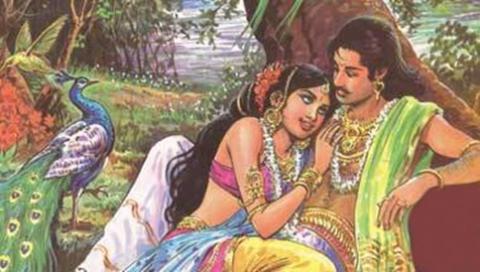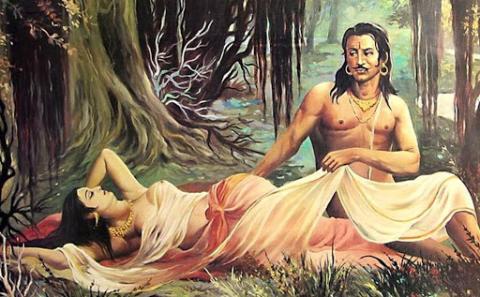
...Continued from the Previous Part
‘If that is the case, don’t feel sad; I’ll go there today; let your only son live; don’t worry about me; I’ve gained special powers; I’m not afraid of the consequences.’ She also agreed. In the evening he went to the palace along with the attendant of the army chief. The princess was like a creeper sagging due to the weight of flowers, haughty due to her youth. That night he worshipped Agni, got his sword,...

The Story of the Brave Vidūṣaka
Once upon a time, there lived a king called Ādityasena, in Ujjayinī. He was an Ekacakravartī, i.e., he was like the Sun who has access to the entire world on his one-wheeled chariot. Once, when he was travelling on the banks of river Gaṅgā, Guṇavarmā, a merchant saw the king. He came forward and spoke - ‘O king! I have a daughter whose beauty is unparalleled in the three worlds; you are the only befitting groom...

The Story of Ahalyā and Devendra
Once upon a time there lived a great seer named Gautama and he was sentient of things from times past, present, and future. He had a wife named Ahalyā, whose beauty surpassed that of the apsarās.
Once, Devendra caught a glimpse of her, was besotted by her beauty, and desired her. The minds of the lords, blinded by riches, takes to immoral paths from time to time, indeed! Ahalyā refused his proposals.
Gautama...

One of the days following this, Vatsarāja had a lavish party where he enjoyed drinking with Vāsavadattā and Padmāvatī. Later he called for Gopālaka, Rumaṇvanta, Vasantaka, and Yaugandharāyaṇa at a place that was not very crowded. During the course of his conversation with them, when the topic turned to his days of separation [from Vāsavadattā], he narrated this tale:
The Story of Ūrvaśī and Purūrava
Long ago, there lived a king named Purūrava,...

Back in the royal palace of Magadha, Vāsavadattā tried to contain her sorrow. She sought solace in gazing upon the paintings depicting Sītā’s woes in the period where she was separated from Rāma. Looking at her beauty and conduct, Padmāvatī was convinced that Avantikā was a high-born lady and treated her accordingly. The princess felt Avantikā’s looks betrayed her noble origins and she had disguised herself, just as Draupadī had in Virāṭa’s...

Once the king refused, the commander married her. Once when the king was roaming, he saw her standing in the balcony of the commander’s house. As soon as he saw her it was as though he was put under a mesmerising spell. He came back to the palace and laid down with great mental agony. Having understood the reason for his present situation, the commander offered, ‘She is your servant, not parastrī[1]; I’ll abandon her in the temple, you can have...

निर्विघ्नविश्वनिर्माणसिद्धये यदनुग्रहम्।
मन्ये स वव्रे धातापि तस्मै विघ्नजिते नमः॥
[Salutation to that deity, the killer of obstacles, (Gaṇeśa), from whom even the creator (Brahmā) seeks blessings so that the creation can happen without hindrances.]
आश्लिष्यमाणः प्रियया शन्करोऽपि यदाज्ञया।
उत्कम्पते स भुवनं जयत्यसमसायकः॥
[Even while embraced by his beloved, because of whom Śaṅkara trembles that wielder of five arrows (Manmatha) will...

The Story of Bālavinaṣṭaka
Long ago there lived a brāhmaṇa named Rudraśarmā; he had two wives; of the two, one of them gave birth to a child and subsequently died. The other wife failed to properly take care of the child; its hands and legs were shrivelled, its stomach was bloated. Husband asked, “Why do you treat an orphan with such contempt?”, she retorted saying, “I’ve been taking good care of him; but what more can be done? He is like this...

The next morning, when he regained his senses, the man was ashamed looking at his state. He cleaned up and rushed to Parivrājikā's house. He tied his head with a piece of cloth to hide the embarrassing seal and pretended to have a severe headache. He wanted the rest of them to face the kind of humiliation he had undergone. He said, ‘As I was returning from her place, thieves robbed me of all my belongings.’
The next three nights, the other three...

Dhanadatta tried to convince him that his son is a suitable groom to his daughter. But Dharmagupta thought that Tāmraliptī was too far and did not agree to this proposal. Meanwhile Devasmitā, having seen Guhasena, was impressed by his qualities and handsomeness, informed through a messenger that she had fallen in love, eloped with him in the night to Tāmraliptī leaving behind all her relatives. There their wedding happened; they lived happily as...
